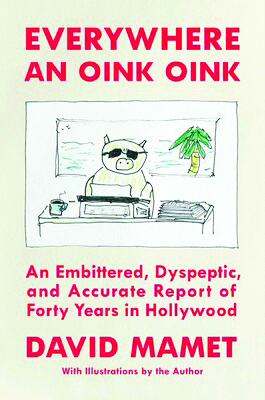A scaredy duck overcomes his fears of the unknown to take his family on an adventure in Migration, a totally acceptable, completely fine 97 minutes of kid-friendly entertainment.
Mack (voice of Kumail Nanjiani) tells his ducklings Dax (voice of Casper Jennings) and Gwen (voice of Tresi Gazal) cautionary bedtime tales about little ducks who venture out on their own only to be killed horribly by assorted predators. Mom Pam (voice of Elizabeth Banks) doesn’t appreciate these nightmare-inducers and she wishes Mack could just cool it with the constant anxiety. When a flock of migrating ducks visits the family pond, Pam is enchanted by tales of the glowing waters of Jamaica and Dax is enchanted by the girl duck in the flock who’s about his age. The family tells Mack it wants to migrate but Mack is dead set against it — until the agreement of an even more homebodied Uncle Dan (voice of Danny DeVito) has Mack rethinking his determination to never leave the pond.
Thus the next morning the whole family, including Uncle Dan, sets out on their trip to Jamaica — though, this being their first migration, they get a little lost and wind up flying into first a storm and then New York City.
In New York the family befriends a pigeon named Chump (voice of Awkwafina) and a tropical bird who is himself from Jamaica named Delroy (voice of Keegan-Michael Key). There is also a side trip to a somewhat too perfect duck paradise and the occasional menacing by a chef who is really dedicated to fresh duck a l’orange.
There are some slow moments but there are also pratfalls, bird goofiness and at least one poo joke. This wasn’t a laugh riot for my kids like the recent Leo but nor was the audience loudly fidgeting as during parts of Wish. The animation, without being particularly revolutionary, is very good and the flight of the birds and the brilliance of their feathers is very eye-catching. The message, such as it is, hits some very general ideas about trying new things and not getting stuck in fear but we don’t get traumatic backstories or disturbing psychology. It’s all very, well, fine. B-
Rated PG for action/peril and mild rude humor, according to the MPA on filmratings.com. Directed by Benjamin Renner and Guylo Homsy with a screenplay by Mike White (yes, that one), Migration is an hour and 37 minutes long and distributed in theaters by Universal Pictures.
Maestro (R)
Bradley Cooper presents his Leonard Bernstein for your consideration in Maestro, a biopic focused on Bernstein’s relationship with his wife Felicia.
The movie bookends itself with an elderly Bernstein (Cooper) giving a television interview — with the movie starting with him playing the piano and talking about seeing the ghost of Felicia (Carey Mulligan) and ending with him saying “any questions?” and I was exhausted before we even jumped to the black and white 1940s flashback.
There we see Lenny, as he’s mostly called, meet Felicia at a party that seems to be filled with theater and literary luminaries as well as friends and family, such as Lenny’s sister Shirley (Sarah Silverman). The movie gives Lenny and Felicia’s relationship the feel of a whirlwind romance (even though Wikipedia and other sources suggest a more “it’s complicated” state of things for some four or five years before getting married); Felicia ultimately seems to propose marriage with a charming “let’s give it a whirl.” The gist seems to be that they are genuinely deeply in love and that Felicia is well aware that Lenny has had relationships with men and will likely want to continue having relationships with men into their marriage.
They live a very chic life, with a lovely mid-century modern apartment in the city and preppy country house in Connecticut and it’s all very fashionable with cigarettes and erudite conversation about art. Over time, though, Felicia, who takes care of the couple’s three children and tries to balance her own career with family and Lenny’s fame, starts to feel pushed aside by and resentful of Lenny’s affairs (and of his fame? The movie doesn’t address Felicia’s relationship with Lenny’s career as much as it feels like it should) leading to relationship turmoil that never seems quite resolved, but then she gets cancer and Lenny stays by her side until the end.
I don’t have a lot of firsthand experience with Leonard Bernstein but I do get the sense that Cooper is doing a very good Bernstein. There’s a voice, mannerisms, facial expressions, the mid-Atlantic whatever — it all has the feel of something exquisitely crafted. But all that production design of Cooper’s Bernstein really gets in the way of a view of Lenny as a person with an interior life who has this deep connection to music and at least one serious romance that he feels compelled to give up because even in his relatively more accepting world of the arts, he just couldn’t love who he wanted and still reach the heights in his career he wanted to reach. I found myself marveling at Cooper’s whole Bernstein creation without feeling much of a connection to the actual person.
In some ways we are seeing Lenny as Felicia saw him, but we also aren’t really getting much interiority of Felicia either. This movie feels oddly all on the surface — I feel like most of Lenny’s personality is delivered via recreations of interviews and Felicia has a few scenes where she sort of monologues her personality, like “here are all my current emotions.” The result is that, while these two people and their relationship are relatively interesting, I didn’t really feel like I was getting to know either of them.
Dream Scenario (R)
Nicolas Cage is the man of many people’s dreams in Dream Scenario, a fun little horror movie about going viral.
Paul Matthews (Cage) is at one point described as a “nobody man,” which feels accurate. A college animal-biology professor with a wife, Janet (Juliet Nicholson), and two daughters, Hannah (Jessica Clement) and Greta (Star Slade), Paul nevertheless has an aura of disappointment and neediness about him. He meets up with someone he knew years ago to confront her about using his research in her upcoming paper and the conversation quickly devolves into him basically begging to be credited. When his daughter dreams of him, he stands by passively as she is sucked into the sky; later he tries to convince her of his real-life (very minor) heroism years earlier.
It turns out a passive Paul has been getting around. An old girlfriend runs into Paul and Janet and tells Paul that she has also had dreams about him, where he is just sort of walking through a scene. Later he overhears two students talking about his appearance in their dreams. An acquaintance tells him about a conversation he had where two women realize they’d been seeing Paul walk through their dreams. When the ex-girlfriend publishes a piece about her Paul dreams, he receives messages from countless other people who say he has also appeared in their dreams. At an ordinary lecture, he suddenly faces a packed auditorium with college students eager to ask him questions, tell him their dreams and later take selfies with him. He does an interview with a TV news show; he is told by a marketing firm that there may be an opportunity for him to do a sponsorship with Sprite. Yes, a man also shows up at his house and tries to kill him, but overall Paul seems to be enjoying his weird fame as a sort of quirky cameo in people’s dreams.
Then something happens. Does it have to do with his groupie-like encounter with a young woman from the marketing firm? Or is it just the inevitable arc of this kind of random fame? Whatever happens, the Paul in people’s dreams goes from benign to violent and Paul the real person finds himself receiving the vitriol earned by his dream doppelganger.
So maybe Sprite is out but how would he feel about going on Tucker Carlson to talk about cancel culture?
The movie touches on issues of social media and the commodification of everything, even infamy, but I feel like it’s the performances, specifically Cage’s, that really makes it work. Cage is great as the always slightly sad, figuratively sweaty Paul. You almost feel sympathy for him but Paul’s response to everything, from being briefly “cool” to suddenly being shunned, is just the right mix of entitlement, desperation and helplessness. It’s a performance that manages to be unflattering and somewhat mean to Paul but also give us glimpses of relatable humanity. The movie is also packed with very good smaller parts: Tim Meadows as a college dean, Dylan Baker as the friend whose dinner parties Paul deeply wants to attend but is never invited to, Michael Cera as the wonderfully insincere marketing guy. B
Rated R for language, violence and some sexual content, according to the MPA on filmratings.com. Written and directed by Kristoffer Borgli, Dream Scenario is an hour and 42 minutes long and is distributed by A24 and available for rent or purchase.
American Symphony (PG-13)
Jon Batiste holds an armful of Grammys and later visits his wife in the cancer ward in the heartbreaking and lovely documentary American Symphony.
Suleika Jaouad has a book on the New York Times bestseller list at the same time her health is failing, Jon Batiste explains. She had leukemia about a decade ago, the subject of her memoir Between Two Kingdoms, and in 2021 she learns she’s had a recurrence. Batiste wins Grammys, works on a symphony he will play at Carnegie Hall and spends his days in hospitals as his wife attempts to regain her health after chemotherapy and a bone marrow transplant. The whiplash of these different worlds is acute but Batiste hangs on, sometimes curling up in bed and talking through the suck of his situation to his therapist but then getting up and going to work. He also balances what must be the weirdness of the photoshoots and the fashion and the talking to Anna Wintour of it all with the work of pulling together a symphony that draws from a wide swath of American musical traditions. We see snippets of the finished work here, enough to make the performance seem deeply cool and I spent a good amount of time looking for that PBS American Masters-like presentation of it (couldn’t find it, yet).
For those who just enjoy watching someone make something, this documentary is thoroughly engrossing. Batiste clearly has ideas about what he wants but also gives his symphony space to develop as the many musicians dip into it. It’s fascinating to watch the process. Equally engrossing is Jon and Suleika’s relationship. They both have their work but Suleika’s is sort of pushed out of reach by the effects of her medications and she has to find other outlets (she turns to painting, and just the idea that she has to find some way to create while medicine sort of happens to her is interesting to contemplate). In the middle of these new troubles this longtime couple decides to get married, and the movie gives you a window into what that means for them, with all the difficulties and optimism.
American Symphony manages to be honest but hopeful, occasionally sad but not maudlin. And it’s a great little window into an artist I think I only really knew on a surface level. A
Rated PG-13 for some strong language, according to the MPA on filmlistings.com. Directed by Matthew Heineman, American Symphony is an hour and 44 minutes long and distributed by Netflix, where it is streaming.
Featured photo: Migration.






